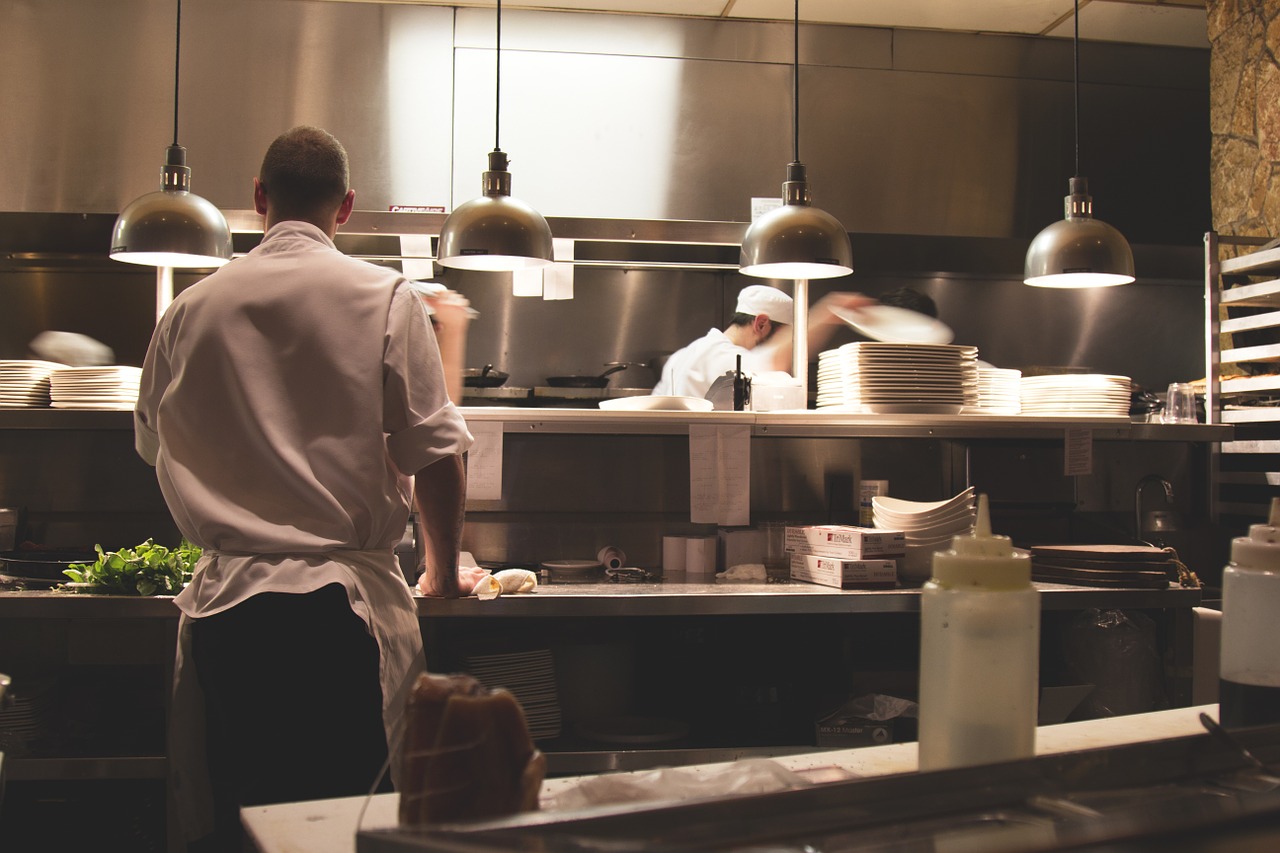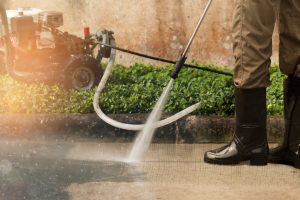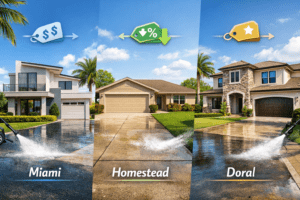Seeing as restaurants serve food, customers and authorities have high expectations for the cleanliness of these establishments. After all, no one wants to eat food if it wasn’t prepared in a hygienic environment.
However, the sheer workload restaurants have to handle on a daily basis can lead to a lot of greasy dirt buildup. To make matters worse kitchen staff such as cooks are often responsible for kitchen cleanup after a long day, leading to rushed efforts to clean the cooking area before heading home.
All these problems add up. Sooner or later, many restaurants owners find themselves scratching their heads, wondering how the place got so dirty so fast and, perhaps more importantly, what can be done to clean the mess up.
Grease in Restaurant Kitchens
The problem with restaurant kitchens is that there’s always movement. Oil is constantly used in cooking for frying and preparing food. As such, almost all the areas of the restaurant, like as windows, kitchen floors and even carpets regularly need a good clean.
Cleaning grease can be rather difficult, though. Which is why many restaurants struggle with a grease problem. However, there are some ways that restaurant staff can improve their daily cleaning routines to more effectively clean grease.
Use Different Mops
It helps to have a different mop for the kitchen and dining area, seeing as the kitchen mop is much more likely to be dirty. By marking mops to distinguish between them, the greasy mop used in the kitchen won’t dirty the dining area. Compared to the other mop, the kitchen mop should regularly be replaced. This same method can be used for all cleaning supplies, like cleaning cloths and squeegees too.
Clean Twice Daily
When faced with the problem of restaurant staff not having enough time to clean properly at the end of a work day, the solution can be as simple as getting someone to come in early each morning to clean all the areas missed the previous evening.
Only one person needs to come in early to clean and staff can rotate the responsibility according to a weekly schedule. Even just 30 minutes of cleaning before the day starts can make a difference to the overall cleanliness of the restaurant.
Using the Right Products
Water alone isn’t effective at cleaning grease. As you might’ve noticed, oil and water don’t generally tend to mix. This is because oil molecules are “water-fearing” meaning they aren’t attracted to water molecules. What this means for your grease cleaning, is that a good cleaning product specifically designed to dissolve oil must be used to clean in the restaurant.
Products that are effective at dissolving grease include:
- Dish soap for general grease cleaning
- Baking soda and vinegar for tough, old oil stains
- Alcohol mixed in water for dissolving grease
- Special de-greasing products
The most important thing is not to try and clean grease stains only with water and products that aren’t effective at cleaning away grease. Because the whole restaurant kitchen can have grease stains, a solution of dish soap (or other mild cleaning agent) and water should be used in all areas of the kitchen, such as counter tops, stoves and even walls.
Cleaning Grease from Floors
Greasy floors can be a problem area in restaurant kitchens. A greasy floor can pose a slipping hazard, so it’s important that the floor be properly de-greased during daily cleaning.
As with any other area in the kitchen, using good cleaning products with de-greasing properties helps, however, following an appropriate cleaning routine is also important. Always clean the kitchen from top to bottom, meaning counters and higher areas should be cleaned first and floor should be left for last. This will help avoid new dirt from getting on the floor when the counters are wiped down, so the floor won’t have to be revisited for cleaning.
For restaurants with carpeted dining areas, occasional food and oil spills can also be a problem. To properly keep carpets clean, it’s important that they are professionally cleaned every once in a while. However, to manage everyday stains between professional cleanings, a waterless carpet cleaner can be used, which can be added on to the stain, left for a while and vacuumed out later. Using such products should help manage the problem until the next professional clean.
Cleaning Greasy Restaurant Windows and Glass
Windows and glass panels are an area often forgotten during daily cleaning. In restaurant kitchens, windows often become full of oil splatter buildup, which can be very tough to clean if left for too long. To manage this problem, it’s important to wipe windows with a de-greasing agent once a day during regular cleaning.
A lot of restaurants have a layout where a glass panel allows customers from the dining area to see into the kitchen where the staff are preparing food, this is often a problem area where grease is exceptionally prone to accumulate. However, any windows and glass panels close to where the food is being prepared are a potential problem area and should be checked for dirt buildup regularly.
If all windows are still looking good, wiping them once a day should be good enough. But if any windows are found to be exceptionally dirty, it’s always best to call in the help of a professional window cleaning service.
Booking regular cleanings will not only help keep all your windows clean, but will also ensure that window areas that are missed during regular cleaning don’t go unwashed for months at a time. Often times, even hard to reach windows that are high up can accumulate some greasiness, especially when they’re located close to the stove.
Restaurant Grease Buildup: When to Call in Professional Help
Training staff to follow a proper cleaning routine, stocking up on effective degreasing agents and often replacing greasy cleaning equipment are all effective ways to control grease in your restaurant on a day to day basis. However, every now and then, it’s good to call in professional help to do some spring cleaning.
Professionals can help clean all the areas often forgotten during daily cleaning and can also assist in hard to clean areas where staff are unable to reach, or dirt is too tough.
Restaurant Power Cleaning for Fire Safety
Scheduling regular cleaning sessions with a professional cleaning company will control potential health hazards in the restaurant in more than one way. Everyone knows that keeping a restaurant kitchen clean is important to control mold, bacteria and other harmful pathogens from growing in the kitchen, but keeping the kitchen clean of grease is also important to control fire hazards.
Oil and grease are both highly flammable substances. When set alight, the resulting fire can spread rapidly. Health and safety comes first in such situations and the fire can spread so fast, staff members are unable to reach for a fire extinguisher before fleeing the scene.
Luckily restaurants do have built in safety equipment to control potential fire hazards. Restaurant hood systems are responsible for ventilating air in restaurant kitchens, maintaining lower levels of oil and smoke in the air.
Restaurant hoods also control the risk of gas fires by cutting gas flow when a fire risk arises. Lastly, most restaurant hoods are equipped with a secondary fire extinguishing system to dispense a fire extinguishing mixture to put out grease fires when necessary.
Hood systems are an integral part of safety in all commercial kitchens and should be kept clean to ensure the safety of staff and other building occupants. However, the restaurant hood does tend to accumulate a lot of grease while performing its function. Left uncleaned, this grease buildup presents an extreme fire hazard.
This is where restaurant power cleaning comes in. Power cleaning is an effective way to clean grease buildup from restaurant hoods, walls and other areas, ensuring that safety measures are met and fire grease hazards are controlled effectively.
Power Cleaning Other Restaurant Areas
Cleaning restaurant hoods is important to ensure fire safety, but there are other areas of the restaurant that might need to be cleaned regularly. Walk in fridges and freezers, restaurant fryers hard and even floors might need a proper cleaning on a regular basis.
For instance, daily floor cleaning might control dirt on floor tiles, but grouting between tiles will also accumulate dirt and grease buildup over time. As with grease in the restaurant hood, grease on the floor can also pose as a fire hazard, although less extreme than in the case of a greasy hood. Another potential health risk associated with greasy floors is a slipping hazard. Although it might not seem so serious, staff members could get very hurt from slipping on a greasy floor – especially in a kitchen area, where stove tops, counters and other objects are always close by.
For restaurant power cleaning in Miami, Kleanway Pressure cleaning is here to help. We provide professional power cleaning services, using the best cleaning equipment for every job. We also offer window cleaning to ensure that all restaurant windows are kept free of dirt. Contact us today to book regular cleaning sessions for your restaurant establishment.






